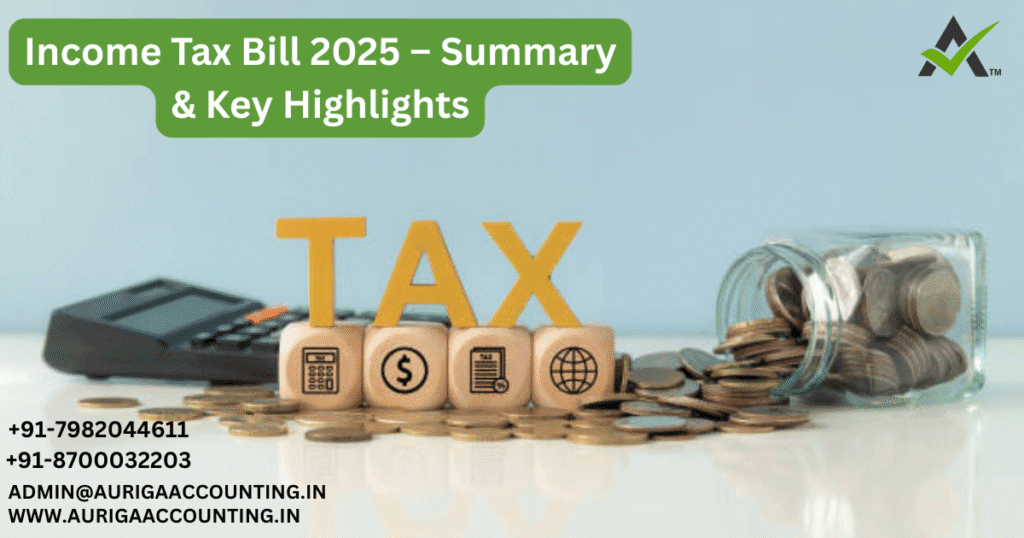Priya is a seasoned Chartered Accountant with over 34 years of experience in Finance, Accounting, and Taxation. His extensive expertise spans across financial management, regulatory compliance, and strategic tax planning.

Income Tax Bill 2025 – Summary & Key Highlights
Introduction
ToggleThe Income Tax Bill 2025 represents a significant overhaul of India’s tax structure, aiming to simplify existing laws, improve compliance, and modernise tax administration. Key reforms include the elimination of outdated provisions, a restructured tax assessment process, and a more streamlined system for Tax Deducted at Source (TDS). With an emphasis on transparency, digital integration, and ease of understanding, the new bill is designed to make the tax system more efficient and taxpayer-friendly. This article outlines the major highlights and implications of the Income Tax Bill 2025.
Key Highlights of the Income Tax Bill, 2025
The Income Tax Bill, 2025, scheduled to be tabled in Parliament on Thursday, February 13, 2025, represents a landmark reform in India’s tax regime. Replacing the Income Tax Act of 1961, this new legislation is designed to modernise and simplify the tax framework and will take effect from April 1, 2026, once passed.
What’s Changing?
Modernised Framework: The bill eliminates obsolete provisions that have accumulated over more than six decades. Its goal is to reduce litigation, simplify tax compliance, and promote voluntary compliance.
Structural Expansion:
The new law comprises 536 sections, compared to 298 sections in the 1961 Act.
The number of Schedules increases from 14 to 16.
Despite broader scope, the document is more concise, reduced to 622 pages through streamlined formatting and clearer language.
New Terminology:
Traditional terms like “Assessment Year” and “Previous Year” are replaced with a single, simplified term: “Tax Year”.
Simplified Language and Format:
Use of shorter sentences, tables, and formulae to explain provisions such as TDS, presumptive taxation, salary income, and bad debt deductions.
All TDS-related provisions are consolidated under a single clause with user-friendly tables.
Empowered Administration:
Under Clause 533, the Central Board of Direct Taxes (CBDT) can frame tax administration rules, implement digital compliance systems, and issue procedural guidelines without requiring frequent parliamentary amendments.
Taxpayer-Centric Measures:
The bill mandates the CBDT to issue a Taxpayer’s Charter, detailing taxpayers’ rights and responsibilities, along with binding directions for tax authorities to uphold these standards.
Elimination of Redundancies:
Fringe Benefit Tax and other outdated provisions have been scrapped.
The bill avoids the use of complex “explanations” and “provisos,” making the law more accessible
About the Author
Priya
February 21, 2026
new
January 10, 2026
January 8, 2026
January 8, 2026
January 8, 2026
January 7, 2026
January 7, 2026
January 7, 2026
January 7, 2026
January 7, 2026
January 7, 2026
January 7, 2026
January 6, 2026
December 31, 2025
December 31, 2025
December 29, 2025
December 29, 2025
December 27, 2025
December 26, 2025
December 26, 2025
December 12, 2025
December 12, 2025
November 29, 2025
November 29, 2025
November 29, 2025
November 28, 2025
November 28, 2025
November 28, 2025
November 27, 2025
November 27, 2025
November 27, 2025
November 26, 2025
November 26, 2025
November 26, 2025
November 25, 2025
November 25, 2025
November 25, 2025
November 24, 2025
November 24, 2025
November 24, 2025
November 24, 2025
November 21, 2025
November 21, 2025
November 19, 2025
November 19, 2025
November 19, 2025
November 15, 2025
November 15, 2025
November 13, 2025
November 13, 2025
November 13, 2025
June 16, 2025
June 13, 2025
June 11, 2025
June 11, 2025
June 10, 2025
June 9, 2025
June 5, 2025
June 5, 2025
June 5, 2025
June 4, 2025
June 3, 2025
May 31, 2025
May 31, 2025
May 28, 2025
May 28, 2025
May 27, 2025
May 27, 2025
May 27, 2025
May 26, 2025
May 26, 2025
May 26, 2025
May 26, 2025
May 26, 2025
May 24, 2025
May 24, 2025
May 24, 2025
May 24, 2025
May 23, 2025
May 23, 2025
May 23, 2025
May 23, 2025
May 23, 2025
May 23, 2025
May 23, 2025
May 22, 2025
May 22, 2025
May 22, 2025
May 21, 2025
May 21, 2025
May 21, 2025
May 21, 2025
May 21, 2025
May 20, 2025
May 17, 2025
May 17, 2025
May 17, 2025
May 17, 2025
May 16, 2025
May 16, 2025
May 16, 2025
May 15, 2025
May 15, 2025
May 15, 2025
May 14, 2025
May 13, 2025
May 13, 2025
May 13, 2025
May 12, 2025
May 12, 2025
May 12, 2025
May 12, 2025
May 10, 2025
May 10, 2025
May 10, 2025
May 10, 2025
May 9, 2025
May 9, 2025
May 9, 2025
May 9, 2025
May 9, 2025
May 8, 2025
May 8, 2025
May 8, 2025
May 8, 2025
May 8, 2025
May 8, 2025
May 8, 2025
May 7, 2025
May 7, 2025
May 7, 2025
May 7, 2025
May 7, 2025
May 7, 2025
May 6, 2025
May 5, 2025
May 5, 2025
May 5, 2025
May 3, 2025
May 3, 2025
May 3, 2025
May 3, 2025
May 3, 2025
April 30, 2025
April 30, 2025
April 29, 2025
April 28, 2025
April 28, 2025
April 28, 2025
April 28, 2025
April 26, 2025
April 26, 2025
April 26, 2025
April 26, 2025
April 26, 2025
April 25, 2025
April 25, 2025
April 24, 2025
April 23, 2025
October 30, 2023
October 30, 2023
October 30, 2023
October 30, 2023
October 28, 2023
October 28, 2023
October 28, 2023
October 28, 2023
October 28, 2023
October 28, 2023
October 28, 2023
October 28, 2023
October 28, 2023
October 27, 2023
October 27, 2023
October 27, 2023
October 27, 2023
October 27, 2023
October 27, 2023
October 27, 2023
October 27, 2023
October 26, 2023
October 26, 2023
October 26, 2023
October 26, 2023
October 26, 2023
RELATED ARTICLES
Key Reasons...
Simple Tax-Saving...
Tax Saving...
Section 80GGA:...
Guide to Income...
How to Verify...
Handling Income...
No posts found












